Analysis: Will CBS’s efforts to brand around ‘mornings’ pay off?
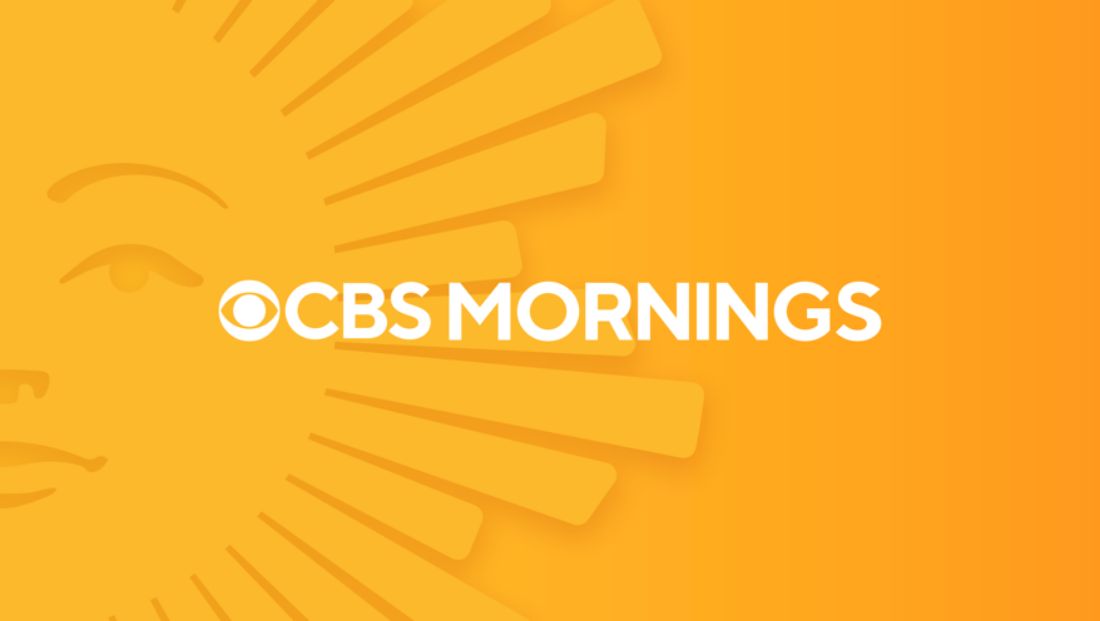
Subscribe to NCS for the latest news, project case studies and product announcements in broadcast technology, creative design and engineering delivered to your inbox.
CBS apparently really wants you to know it’s a “morning” network.
The network announced that it’s renaming its third place “CBS This Morning” show as simply “CBS Mornings” in an effort to align it better with the show’s venerable “CBS News Sunday Morning” show.
Obviously the network already used the word “Mornings” in the show name — the new name drops a “This” and adds an “s” — but that change, however subtle, makes the network’s morning offerings become more of a “family.”
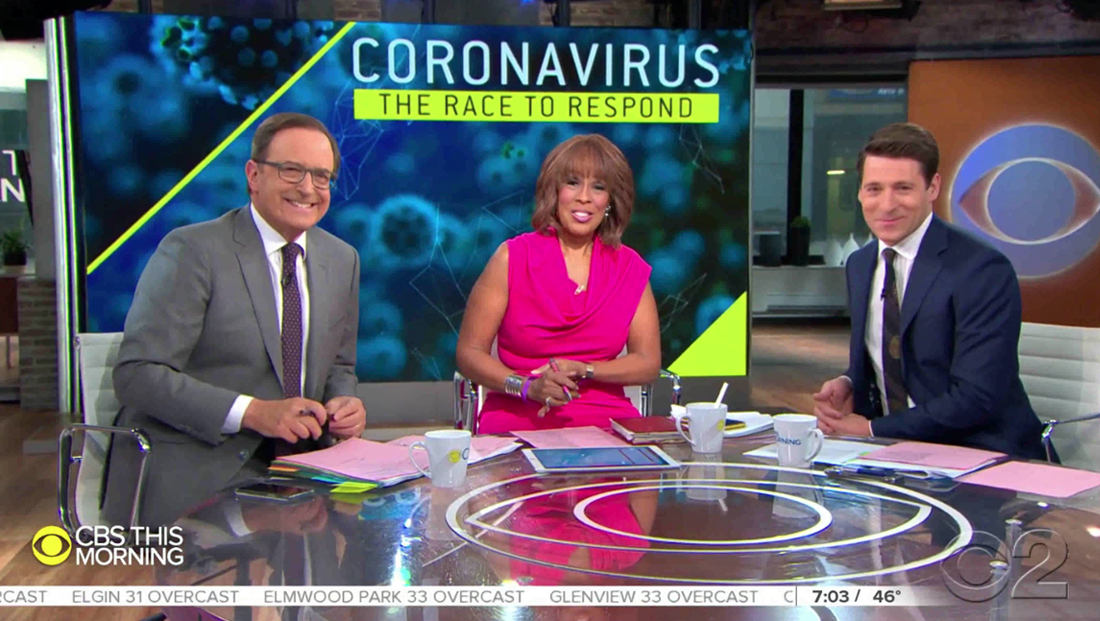

CBS also calls its early morning newscast that many stations air right before local news starts “CBS Morning News” — so that’s another instance all those “mornings” floating around.
The change is even more obvious with the “This Morning” Saturday edition, which is becoming “CBS Saturday Morning,” which is even closer to the “Sunday Morning” branding.
It’s worth noting that the Sunday Jane Pauley hosted show is officially titled “CBS News Sunday Morning,” but is more popularly called simply “Sunday Morning” or, to some, “CBS Sunday Morning.”
Semantics aside, ultimately what’s going to cement the marriage of “morning”-titled shows on CBS is the use of the “Sunday Morning” sun icon and theme music, both of which are highly recognizable to any fan of Pauley’s show (and Charles Osgood and Charles Kuralt before her).
In fact, during Kuralt’s days, the network experimented with having him come in weekdays for a morning show. For a time, the show had five different names, starting with “CBS Monday Morning” and continuing through the four other days of the week.
A naming scheme like this could be incorporated unofficially for “CBS Mornings” either in graphics or as an announce or host greeting, similar to how “If it’s Monday…” and the rest of the days of the week are used during “MTP Daily” on MSNBC (that’s a nod to the “If it’s Sunday, it’s ‘Meet the Press'” line that the “MTP Daily” parent show uses).
What’s not as clear is how well “CBS Mornings” will carry on the “Sunday Morning” brand in terms of content. “Sunday” is known for being a bit highbrow and focuses heavily on culture, the arts and video essays, all introduced by Pauley in a purposeful, slower narration style.
Its segments are longer than most TV news programs typically air and in many ways it’s sort of an early, if lighter, edition of “60 Minutes,” another iconic CBS News program that typically airs later the same day.
CBS did announce that former “CBS This Morning” co-anchor Anthony Mason, who left in favor of CBS Sports analyst and former NFL player Nate Burleson to join the desk, will contribute “cultural” reports to the show, so that could be a hint of how the network plans to connect “Mornings” with “Sunday Morning.”
In the same announcement, CBS also noted that the second hour of “Mornings,” running 8 to 9 a.m. eastern, will begin to focus more on feature segments.
When “CBS This Morning” was revived in 2012, it was billed as a more hard news program — no cooking segments, no couches for interviews.
That format has loosened over the years, with segments such as “Talk of the Table” and “What to Watch” infusing more of the happy host chat and banter seen on other networks.
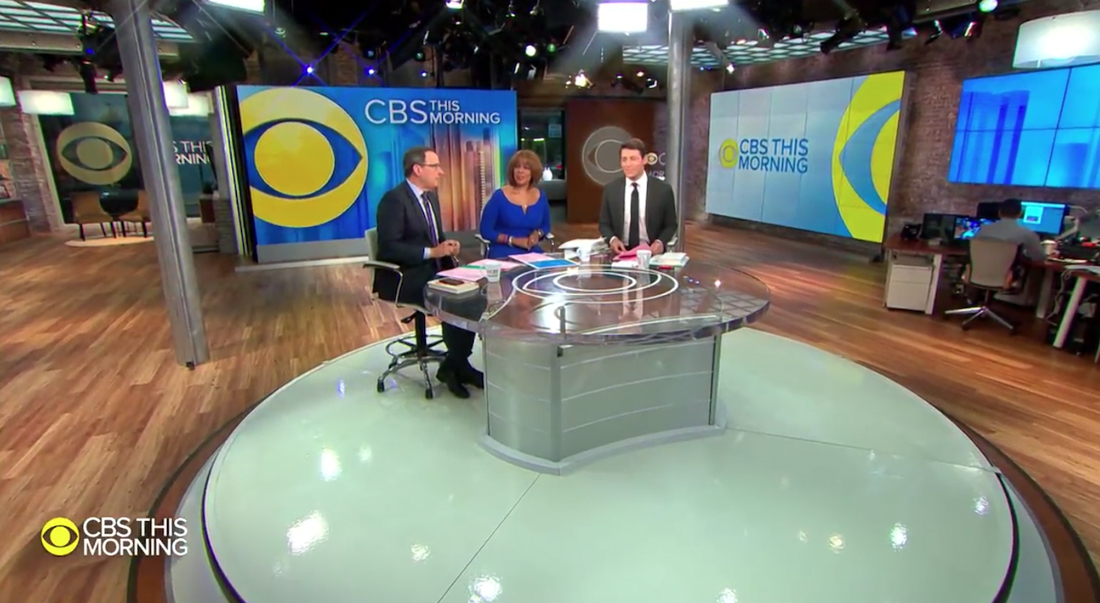

The show even experienced a “mini-retooling” in 2019, when Mason and Tony Dokupil were added as anchors and the network added the “Talk” and “Watch” segments.
One of the trickiest parts will be how to balance “features” from becoming too close to the “infotainment” end of the spectrum. Is the solution to that to focus more on arts and culture like on Sundays? Or will the show need to succumb to more pop culture news like “Pop Start” on NBC’s “Today” or “Pop News” on ABC’s “Good Morning America?”
There’s certainly nothing wrong with covering pop culture and even lighter news — it’s a big part of the news cycle and has been a mainstay on morning TV for decades.
A big risk of branding all of its morning programming together with not only the same name but also look and sound is that viewers will begin to associate one with the other.
CBS has struggled with its morning block for decades, trying countless combinations of anchors, sets, formats and titles going back to 1987 (“The Early Show” was wedged in there from 1999 to 2012).
So, what happens if “Mornings” still doesn’t budge the ratings needle and the network has to backtrack with more changes? Does that somehow affect the “Sunday Morning” brand? Or will viewers find it comforting to hear that familiar fanfare seven days a week now?
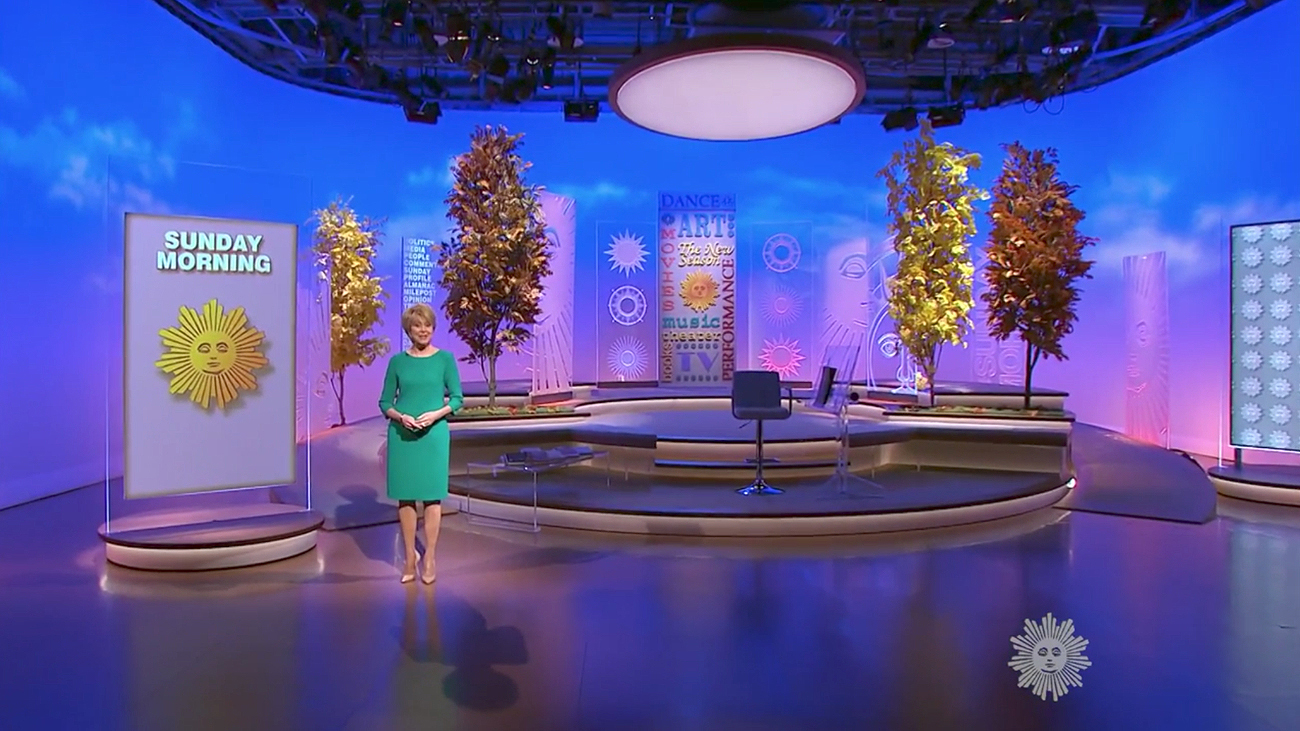

The studio of ‘CBS Sunday Morning.’
It does appear that “Sunday Morning” is going to keep its distinct studio design that features freestanding glass panels and video screens enveloped by a colorful cyc — and “Mornings” is going with a solidly more structural look, so that, at least, will keep the shows separate on some level.
All told, CBS also doesn’t have much to lose with this change. It’s mostly in third place with its weekday morning and evening newscasts, despite heavily investments in talent, sets and graphics updates.
“This Morning” did show some promise, managing to sneak up on second place “Today” back in November 2016, but the Charlie Rose sexual harassment accusations and his subsequent firing followed just a few months later.
It’s hard to say definitively if Rose was the lynchpin in the brief ratings spikes but either way the show mostly failed to maintain its momentum — and an executive producer change in 2018 also didn’t seem to help much.
That said, “Sunday Morning” and Sunday morning political affairs program “Face the Nation” often rank at the top of their respective categories, assuming “Sunday” is considered a “morning news program.”
It’s a bit tricky to compare Sunday ratings show against show because schedules can vary depending on time zone or market. For example, CBS’s “Face the Nation” is offered as a full 60 minute broadcast, but some stations carry only 30 minutes of it — and its timeslot, like its competitors on ABC and NBC, varies.
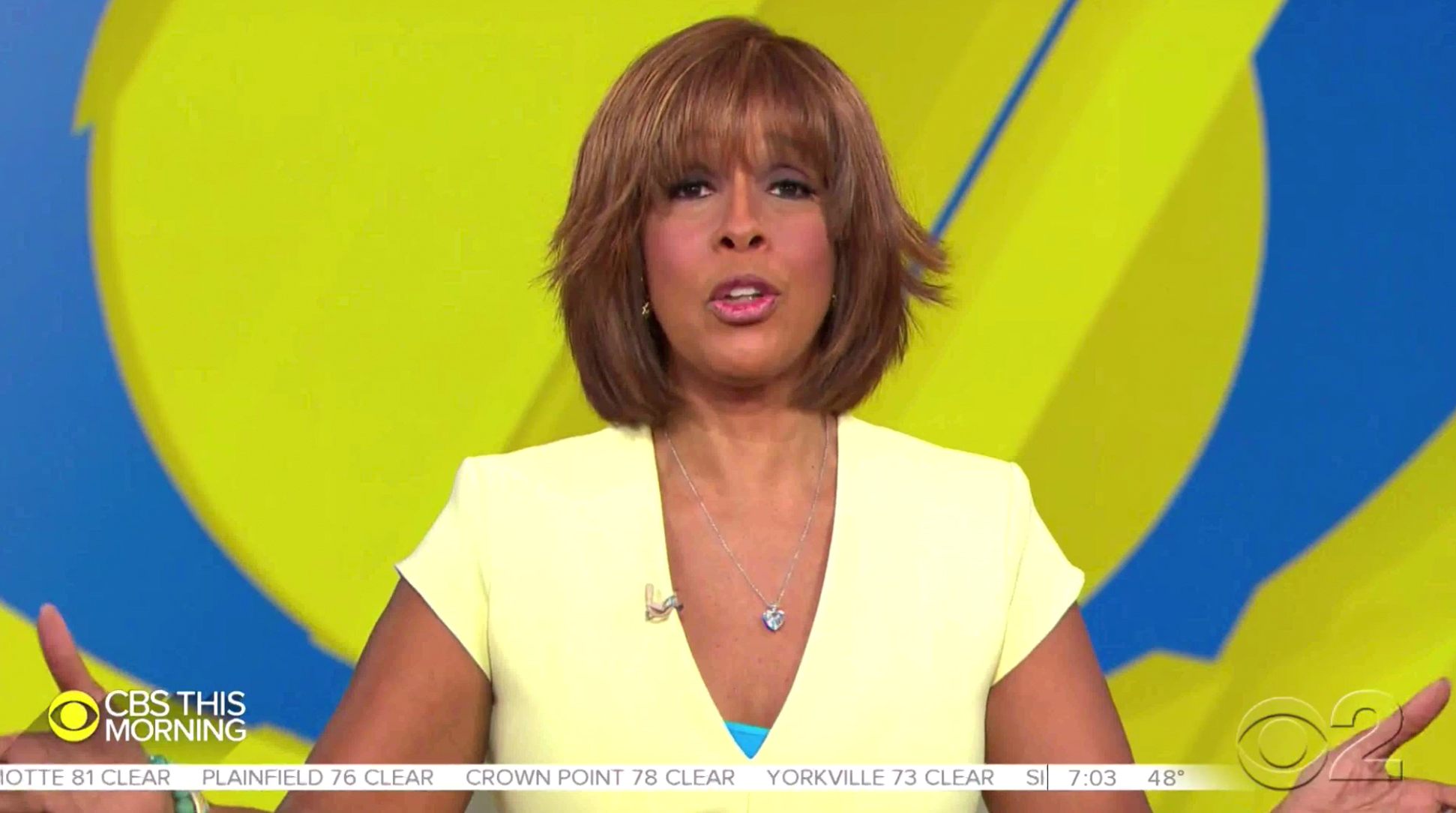

One thing that has remained a constant on CBS weekday mornings, however, is King. Despite the fact she’s the main common denominator in a series of low rated efforts to retool the morning show since 2012, she’s managed to survive.
In fact, King was originally relegated only to the second hour of the show when it launched — perhaps producers felt her well known role as Oprah Winfrey’s best friend was better suited for later in the broadcast. However, she gradually increased in time on air and now serves as the de facto lead anchor.
She’s reportedly popular with CBS management and gained significant attention for her R. Kelly interview in 2019, though in many ways more people saw the clips of that on social media and memes than on the actual show — which doesn’t do CBS much good if it’s doesn’t draw viewers.
In fact, after negotiating a reported $11 million a year deal to stay at CBS following the R. Kelly interview that coincided with bringing in Dokupil and Mason, ratings dipped 20%.
CBS may have to be content with not being top in the ratings — at least for the immediate future — but it can still very well make money off that by delivering a certain type of viewer to advertisers. After all, even at some of its lowest points, the show still delivers at least a million viewers.
Of course, finding that perfect blend of talent, content and look and feel that sits well with viewers and their morning coffee is an allusive elixir that, if ever distilled to something concrete, would be worth billions.
Seismic shifts in ratings as also require convincing people to change channels — no easy task for any network. While bringing in big names with multimillion dollar contracts sometimes works — it can also just as easily get ignored or briefly attract new viewers to see what’s up before they go back to their old habits.
Looking forward, CBS likely has its fingers crossed that its latest changes will do the trick — and it will be noteworthy to see how long the network is willing to stick with the changes to give them a chance to “settle in” before another shakeup or rebranding.
Subscribe to NCS for the latest news, project case studies and product announcements in broadcast technology, creative design and engineering delivered to your inbox.







tags
CBS, CBS News, CBS News Sunday Morning, CBS Saturday Morning
categories
Broadcast Industry News, Featured, Network Morning Shows